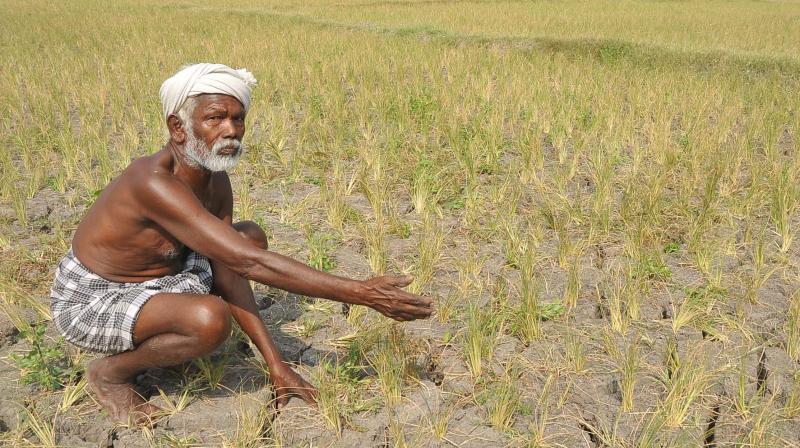Rain God fails to help Madurai farmers

Madurai: After lord ‘Paramasivan swamy' who dwells atop a hillock near Koppilipatti village failed to answer the prayers of people of five villages around that temple, the villagers feel that there is no point staying back and looking up for the sky to open up.
The five severely drought-hit villages of Thimmanatham panchayat in Usilampatti taluk in Madurai district, is so parched that the people are forced to sell their livestock at rock-bottom prices, all because the Rain gods failed during both the monsoon periods in 2016.
"We don't have water to drink, then how can we feed our cattle? Moreover, we don't want them to die in front of us," said farmer O Sakthivel (30), who had sold his five cows for just Rs 46,000.
The signs of a killer-drought are evident as the wide stretch of field present a pathetic picture with cracks on the earth surface. The standing crops have withered in the fields for want of water. Nearly 10,000 acres of crops including paddy, sugarcane, guava, and millets have been lost in this panchayat alone.
"We all observed fast for 'Paramasivan swamy' and gave Annadanam (the sacred offering of food) in the hillock recently praying for rains, but he too failed us," said 60-year-old Chinnathevan from the village.
Chinnathevan works for long hours in few farmlands without any monetary benefits to source water for his cows. "Some farm wells in the village are left with some water resources, but I have to work like a slave in those lands to get 20 pots of water," he bemoaned.
As the authorities are supplying drinking water only once in four days, it is not sufficient to meet their daily requirements. However, with a head of cattle needing to be feed with 75 litres of water per day, some middle-level farmers jointly purchase 4,000 litres from private water supplies once in two days and share it among themselves. "We are left with no option because the milk agents, who had loaned us for purchasing the cattle, wouldn't allow us to sell it. We need to supply milk to them regularly," rued the farmers.
But in the case of marginal farmers and agricultural labourers (though cattle provides a stable income for them even during the non-agriculture seasons) they have sold the cattle and migrated to 'dollar towns' like Tirupur, and those in north Indian states looking for jobs in 'Murukku (snacks)' manufacturing units. In Koppilipatti village alone nearly 500 cattle had been sold to go for slaughterhouses in Kerala. The pathos cannot be starker for people. "Only elders are living in the village," said a disillusioned Sakthivel, a graduate who took up agriculture with passion.
"We can't even depend on employment under Mahatma Gandhi National Rural Employment Guarantee Act scheme (Mgnrega) because they pay salary once in two months. After the monsoon failure, they have also stopped employing more people," claimed women in the villages.
Many farmers sustained huge lose digging bore wells in desperation to safeguard the crops after the Northeastern monsoon failed in the district. For instance in E Nadupatti, farmer Mohan and his brothers had spent Rs six lakh in digging bore-wells to save the coconut crops, but only in vain. "Now the two brothers have migrated to towns looking for job," said Ramar, who also sustained crop loss due to the drought in Tamil Nadu.
Unlike the delta region, nearly 60 per cent of farmers depend on rainfed cultivation, which meant the drought would have serious impact in this region. Hence, the government should pay relief to all the farmers in the district without looking into technicalities, said a senior agricultural officer.

